高三英语考试题
高三全国英语试题及答案

高三全国英语试题及答案一、听力部分(共30分)1. 根据所听内容,选择正确答案。
A. 5:00 pmB. 6:00 pmC. 7:00 pmD. 8:00 pm【答案】B2. 根据对话,选择最佳选项。
A. He will go to the library.B. He will go to the cinema.C. He will go to the concert.D. He will go to the museum.【答案】A...二、阅读理解(共40分)A. 阅读理解A篇根据所给文章,回答以下问题。
1. What is the main idea of the passage?A. The importance of education.B. The benefits of traveling.C. The impact of technology.D. The role of government.【答案】C2. According to the author, what is the most significant change brought by technology?A. Improved communication.B. Increased efficiency.C. Enhanced security.D. Greater convenience.【答案】B...B. 阅读理解B篇...三、完形填空(共20分)阅读下面的短文,从每题所给的四个选项中,选出最佳选项。
1. The project was a great success, _______ it was not without its challenges.A. althoughB. becauseC. butD. so【答案】A2. Despite the difficulties, the team worked together and _______ the project on time.A. completedB. abandonedC. delayedD. postponed【答案】A...四、语法填空(共10分)阅读下面的短文,根据短文内容,用括号中所给词的适当形式填空。
高三英语模考试题及答案
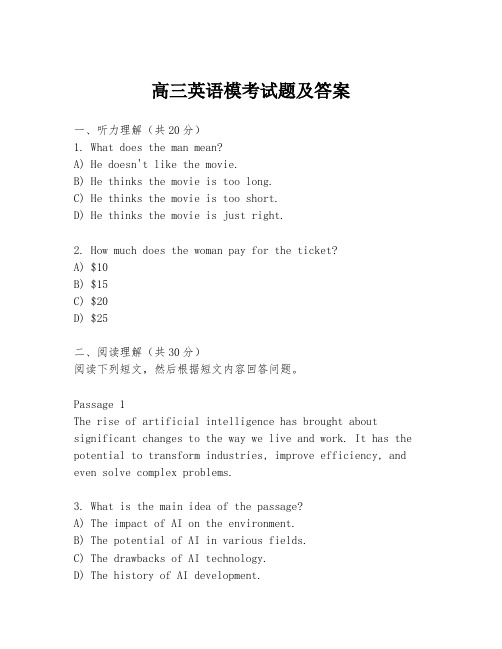
高三英语模考试题及答案一、听力理解(共20分)1. What does the man mean?A) He doesn't like the movie.B) He thinks the movie is too long.C) He thinks the movie is too short.D) He thinks the movie is just right.2. How much does the woman pay for the ticket?A) $10B) $15C) $20D) $25二、阅读理解(共30分)阅读下列短文,然后根据短文内容回答问题。
Passage 1The rise of artificial intelligence has brought about significant changes to the way we live and work. It has the potential to transform industries, improve efficiency, and even solve complex problems.3. What is the main idea of the passage?A) The impact of AI on the environment.B) The potential of AI in various fields.C) The drawbacks of AI technology.D) The history of AI development.Passage 2In recent years, there has been a growing interest in renewable energy sources. Solar panels, wind turbines, and hydroelectric dams are just a few examples of how we are harnessing the power of nature to create clean energy.4. What is the author's purpose in writing this passage?A) To discuss the benefits of renewable energy.B) To argue against the use of fossil fuels.C) To describe the process of energy production.D) To compare different types of energy sources.三、完形填空(共20分)阅读下面的短文,从每题所给的四个选项中,选出一个最佳答案。
高三英语试题大全

高三英语试题答案及解析1.When I was growing up, I had an old neighbor named Dr. Gibbs. He didn’t look like any doctor I’d ever known. He never yelled at us for playing in his yard. I remember him as someone who was a lot nicer than most of the adults in our community.When Dr. Gi bbs wasn’t saving lives, he was planting trees. His house sat on ten acres, and his life’s goal was to make it a forest.The good doctor had some interesting theories concerning plant care and growth. He never watered his new trees, which flew in the face of conventional wisdom. Once I asked why. He said that watering plants spoiled them so that each successive tree generation would grow weaker and weaker. So you have to make things rough for them and weed out(淘汰) the weaker trees early on. He talked about how watering trees made for shallow roots, and how trees that weren’t watered had to grow deep roots in search of moisture. I took him to mean that deep roots were to be treasured.So he never watered his trees. He planted an oak and, instead of watering it every morning, he beat it with a rolled-up newspaper. Smack! Slap! Pow! I asked him why he did that, and he said it was to get the tree’s attention.Dr. Gibbs passed away a couple of years after I left home. Every now and again, I walked by his house and looked at the trees that I’d watched him plant some twenty-five years ago. They’re extremely tall, big and robust since they have deep roots now. However, the trees in my garden trembled in a cold wind although I had watered them for several years.It seems that adversity(逆境) and suffering benefit these trees in ways comfort and ease never could. I stood there deep in thought.Every night before I go to bed, I check on my two sons. I stand over them and watch their little bodies, the rising and falling of life within. I often pray for them. Mostly I pray that their lives will be easy. But I think that it’s time to change my prayer(祷词) because now I know my children are going to encounter hardship.【1】According to Dr. Gibbs’ theories, trees will become weake r if they _________.A.are lack of care B.are watered C.are weeded out D.are beaten【答案】B【2】According to Para.3 and Para.4, we can infer that Dr. Gibbs’ motto(座右铭) may be . A.“Seeing is believing”B.“Put everything in proper use”C.“Practice makes perfect”D.“No pain, no gain”【答案】D【3】 The underlined word robust in Para.5 most probably means _________.A.strong B.strange C.deep D.old【答案】A【4】Which of the following may be the author’s best prayer for his two sons now?A.I wish them strong wings, with which they can fly higher and touch the sky.B.I wish them nice fortune so that they can meet people like Dr. Gibbs in the future.C.I wish them deep roots into the earth since the rains fall and the winds blow often.D.I wish them great shades under the tree since the sunlight is always sharp and bitter.【答案】C【5】Which of the following can be the best title of this passage?A.A Nice Doctor B.The Deep Roots C.Adversity andSufferingD.My ChildhoodMemory【答案】B2. Susan was expecting her favourite singers, but to her disappointment, ____ appeared. A.some B.none C.everyone D.no one【答案】B【解析】略3.此题要求改正所给短文中的错误。
高三英语试题大全
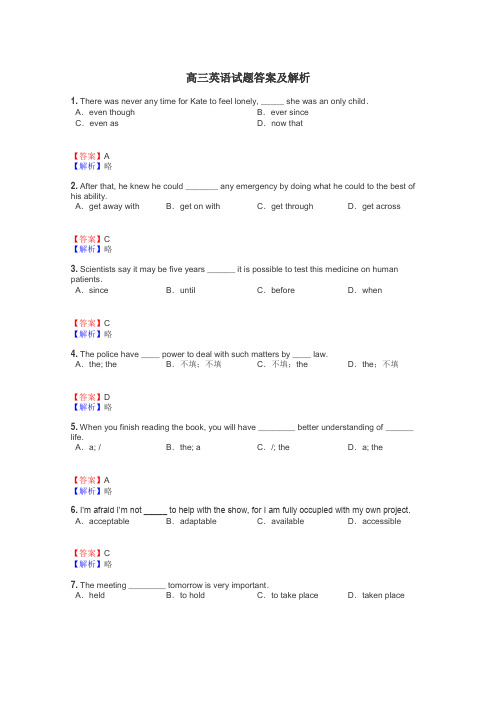
高三英语试题答案及解析1. There was never any time for Kate to feel lonely, _____ she was an only child.A.even though B.ever sinceC.even as D.now that【答案】A【解析】略2. After that, he knew he could _______ any emergency by doing what he could to the best of his ability.A.get away with B.get on with C.get through D.get across【答案】C【解析】略3. Scientists say it may be five years ______ it is possible to test this medicine on human patients.A.since B.until C.before D.when【答案】C【解析】略4. The police have ____ power to deal with such matters by ____ law.A.the; the B.不填;不填C.不填;the D.the;不填【答案】D【解析】略5. When you finish reading the book, you will have ________ better understanding of ______ life.A.a; /B.the; a C./; the D.a; the【答案】A【解析】略6.I’m afraid I’m not _____ to help with the show, for I am fully occupied with my own project. A.acceptable B.adaptable C.available D.accessible【答案】C【解析】略7. The meeting ________ tomorrow is very important.A.held B.to hold C.to take place D.taken place【解析】略8.假设你是李华,宁夏某中学高中学生,今年暑假将前往澳大利亚参加主题为WATER FOR LIFE 的交流活动。
上海英语高三试题及答案
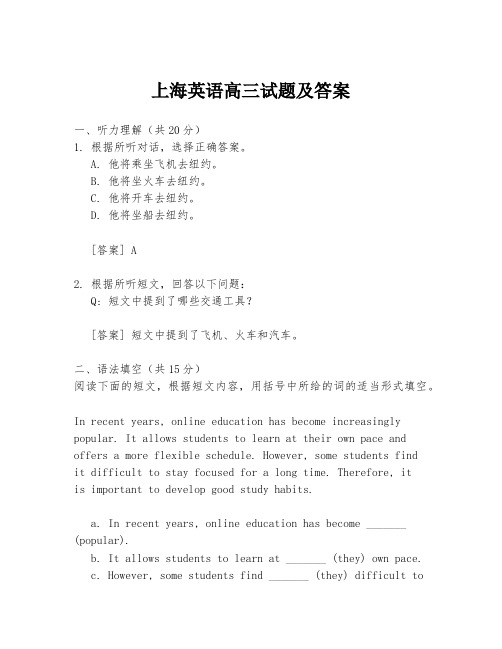
上海英语高三试题及答案一、听力理解(共20分)1. 根据所听对话,选择正确答案。
A. 他将乘坐飞机去纽约。
B. 他将坐火车去纽约。
C. 他将开车去纽约。
D. 他将坐船去纽约。
[答案] A2. 根据所听短文,回答以下问题:Q: 短文中提到了哪些交通工具?[答案] 短文中提到了飞机、火车和汽车。
二、语法填空(共15分)阅读下面的短文,根据短文内容,用括号中所给的词的适当形式填空。
In recent years, online education has become increasingly popular. It allows students to learn at their own pace and offers a more flexible schedule. However, some students findit difficult to stay focused for a long time. Therefore, itis important to develop good study habits.a. In recent years, online education has become _______ (popular).b. It allows students to learn at _______ (they) own pace.c. However, some students find _______ (they) difficult tostay focused for a long time.[答案]a. more popularb. theirc. it三、阅读理解(共30分)阅读下面的文章,然后回答问题。
Passage 1The benefits of exercise are well known. Regular physical activity can improve heart health, reduce stress, and boost mood. It is also a great way to meet new people and enjoy the outdoors.1. What are some of the benefits of exercise mentioned in the passage?A. Improved heart healthB. Reduced stressC. Boosted moodD. All of the above[答案] D2. What is the main topic of the passage?A. The importance of meeting new peopleB. The importance of enjoying the outdoorsC. The benefits of exerciseD. The drawbacks of exercise[答案] CPassage 2With the development of technology, more and more people are using smartphones. However, the overuse of smartphones canlead to health issues such as eye strain and poor posture.1. What is the main concern of the passage?A. The benefits of smartphonesB. The drawbacks of smartphone overuseC. The development of technologyD. The importance of good posture[答案] B2. What can be inferred from the passage?A. Smartphones are not useful.B. People should avoid using smartphones.C. The use of smartphones should be moderate.D. Technology is causing health problems.[答案] C四、完形填空(共15分)阅读下面的短文,从每题所给的选项中选择最佳答案。
高三英语试题及答案免费
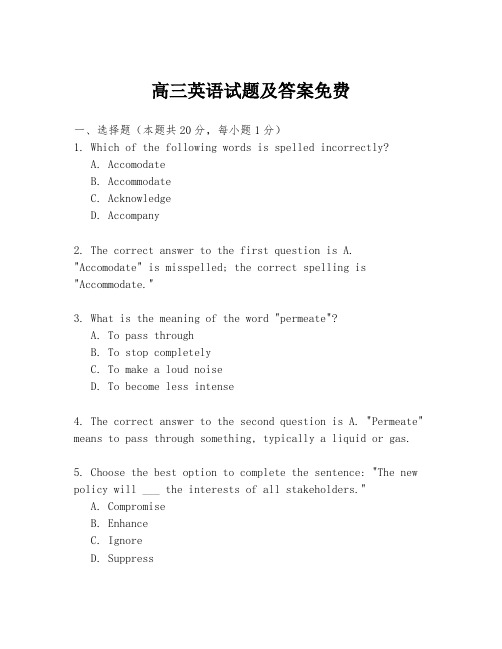
高三英语试题及答案免费一、选择题(本题共20分,每小题1分)1. Which of the following words is spelled incorrectly?A. AccomodateB. AccommodateC. AcknowledgeD. Accompany2. The correct answer to the first question is A. "Accomodate" is misspelled; the correct spelling is "Accommodate."3. What is the meaning of the word "permeate"?A. To pass throughB. To stop completelyC. To make a loud noiseD. To become less intense4. The correct answer to the second question is A. "Permeate" means to pass through something, typically a liquid or gas.5. Choose the best option to complete the sentence: "The new policy will ___ the interests of all stakeholders."A. CompromiseB. EnhanceC. IgnoreD. Suppress6. The correct answer to the third question is B. "Enhance"is the best option to complete the sentence, indicating that the new policy will improve the interests of all stakeholders.... (Continue with the rest of the questions and answers)二、完形填空(本题共15分,每空1分)Read the following passage and fill in the blanks with the most suitable word from the choices given.In a small village, there was an old man who was known forhis wisdom. One day, a young man approached him with a question. "How can I live a happy life?" The old man thought for a moment and then said, "To live a happy life, you must first ___7___ your own happiness."7. A. findB. createC. believeD. expectThe correct answer for the blank is B. "create," as the old man suggests that one must actively create their own happiness.... (Continue with the rest of the blanks and their answers)三、阅读理解(本题共30分,每篇5分)Read the following passages and answer the questions that follow.Passage 1(Here would be the text of the passage.)Questions:1. What is the main idea of the passage?2. According to the passage, why is it important to have a positive attitude?3. How does the author suggest we can overcome challenges?... (Provide answers to the questions based on the passage content)四、翻译题(本题共15分,每题5分)Translate the following sentences into English.1. 随着科技的发展,我们的生活变得越来越便利。
(完整word)高三英语试题
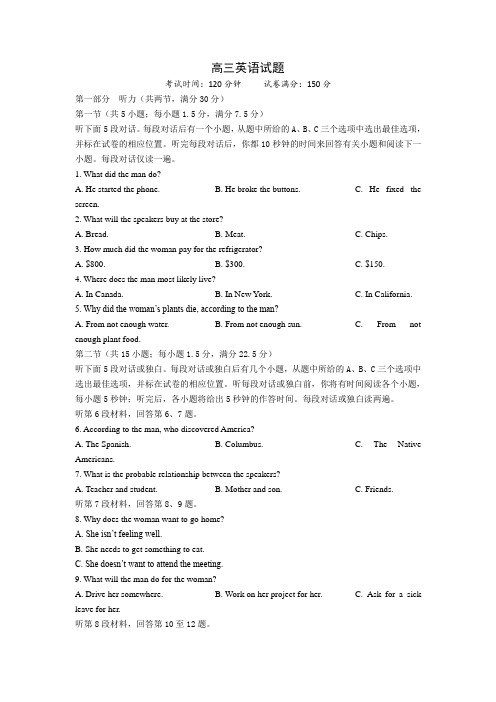
高三英语试题考试时间:120分钟试卷满分:150分第一部分听力(共两节,满分30分)第一节(共5小题;每小题1.5分,满分7.5分)听下面5段对话。
每段对话后有一个小题,从题中所给的A、B、C三个选项中选出最佳选项,并标在试卷的相应位置。
听完每段对话后,你都10秒钟的时间来回答有关小题和阅读下一小题。
每段对话仅读一遍。
1. What did the man do?A. He started the phone.B. He broke the buttons.C. He fixed the screen.2. What will the speakers buy at the store?A. Bread.B. Meat.C. Chips.3. How much did the woman pay for the refrigerator?A. $800.B. $300.C. $150.4. Where does the man most likely live?A. In Canada.B. In New York.C. In California.5. Why did the woman’s plants die, according to the man?A. From not enough water.B. From not enough sun.C. From not enough plant food.第二节(共15小题;每小题1.5分,满分22.5分)听下面5段对话或独白。
每段对话或独白后有几个小题,从题中所给的A、B、C三个选项中选出最佳选项,并标在试卷的相应位置。
听每段对话或独白前,你将有时间阅读各个小题,每小题5秒钟;听完后,各小题将给出5秒钟的作答时间。
每段对话或独白读两遍。
听第6段材料,回答第6、7题。
6. According to the man, who discovered America?A. The Spanish.B. Columbus.C. The Native Americans.7. What is the probable relationship between the speakers?A. Teacher and student.B. Mother and son.C. Friends.听第7段材料,回答第8、9题。
高三英语试卷高考真题

高三英语试卷高考真题近年来,高三英语试卷的难度逐渐增加,考查的内容也更加注重学生的综合能力。
以下是一份高考真题,供同学们参考复习。
一、单项选择题1. — Have you ever been to Australia?— No, but I_____.A. have gone to CanadaB. have been to EnglandC. went to AmericaD. will go there next year2. The reason why I am late is __ I missed the bus.A. becauseB. because ofC. thatD. as3. It is said that the novel______ through several editions since it______ last year by this famous writer.A. went; was publishedB. had gone; had been publishedC. went; had been publishedD. has gone; was published4. The deserted house,______ the roof fell in during the last storm,was beyond repair.A. whichB. in whichC. whereD. whose5. You’d better hurry up______ you want to catch the bus.A. thoughB. sinceC. unlessD. if二、阅读理解Passage 1People's demand for sugar drove the growth of the sugar industry,with profits legally created from the captured warmth of living human bodies.In 1791,Paterson elected to use his readers to provide the answer. “I am afraid I do not clearly understand what the heads of your sugar plantations have to do with the business,”one of his readers,labelled “A Constant Reader,”wr ote in the New York Daily Advertiser in support of the crop in 1791. Paterson responded the following day,speaking directly to his “Constant Reader” about black bodies being turned into sugar profit,turned into sweat. “After this picture has been finely dr awn out,let me ask cannot all this be done without the cruel treatment o f your negroes which you allow these 'Capitalists in the East Indies' to receive a few hanks for their sugars.”6. What is sugar mainly made from according to the passage?A. The captured warmth of human bodies.B. Demand from wealthy plantation owners.C. Sugar plants.D. The hard work of slaves.7. Who was Paterson and how did he respond to his readers according to the passage?A. Paterson was a reader and he tried to convince other readers about the benefits of growing sugar.B. Paterson was a plantation owner and he criticized his readers for their cruel treatment of slaves.C. Paterson was a reader and he responded to his readers' questions by writing in the newspaper.D. Paterson was a plantation owner and he responded to his readers by sharing profits with them.Passage 2Health authorities have declared that sulfites in restaurant foods are safe for most people when they are consumed in moderation. However,some people are sensitive to sulfites and can have adverse effects if they eat foods containing them. These effects can range from mild symptoms,such as headaches and skin rashes,to severe reactions,such as breathing difficulties and life-threatening reactions in people with asthma. People who suffer from such reactions should avoid foods with sulfites.8. According to health authorities,sulfites in restaurant foods are _____.A. always harmfulB. safe for everyoneC. dangerous in moderationD. only harmful for certain people9. What can happen to people with asthma if they eat foods with sulfites?A. They may have mild symptoms such as headaches.B. They may have breathing difficulties.C. They may have skin rashes.D. They may have life-threatening reactions.三、写作题请你以“2021年高考英语试卷分析”为题,根据以下要点,写一篇短文:1. 试卷难度适中,题目涵盖了听力、阅读、填空、单选、完形填空等多方面内容;2. 阅读理解部分考查了学生的阅读理解能力,包括推理、细节理解等;3. 写作部分要求学生展开想象、运用所学语法知识,表达清晰,逻辑性强。
- 1、下载文档前请自行甄别文档内容的完整性,平台不提供额外的编辑、内容补充、找答案等附加服务。
- 2、"仅部分预览"的文档,不可在线预览部分如存在完整性等问题,可反馈申请退款(可完整预览的文档不适用该条件!)。
- 3、如文档侵犯您的权益,请联系客服反馈,我们会尽快为您处理(人工客服工作时间:9:00-18:30)。
高二英语阅读理解(共两节,满分40分)第一节(共15小题,每小题2分,满分30分)AEdmund Halley was an English scientist who lived over 200 years ago. He studied the observations of comets(彗星) which other scientists had made. The orbit of one particular comet was a very difficult mathematical problem. He could not figure it out. Neither could other scientists who dealt with such problems.However, Halley had a friend named Isaac Newton, who was a brilliant mathematician. Newton thought he had already worked out that problem, but he could not find the papers on which he had done it. He told Halley that the orbit of a comet had the shape of an ellipse.Now Halley set to work. He figured out the orbits of some of the comets that had been observed by scientists. He made a surprising discovery. The comets that had appeared in the years 1531, 1607 and 1682 all had the same orbit. Yet their appearances had been 75 to 76 years apart.This seemed very strange to Halley. Three different comets followed the same orbit. The more Halley thought about, the more he thought that there had not been three different comets, as people thought. He decided that they had simply seen the same comet three times. The comet had gone away and had come back again.It was an astonishing idea! Halley felt certain enough to make a prediction of what would happen in the future. He decided that this comet would appear in the year 1758. There were 53 years to go before Halley's prediction could be tested.In 1758 the comet appeared in the sky. Halley did not see it, for he had died some years before. Ever since then that comet had been called Halley's comet, in his honour.1.Halley made his discovery________.A.by doing experiments B.by means of his own careful observation C.by using the work of other scientists D.by chance2.Halley made a surprising but correct prediction in the year________.A.1704B.1705C.1706D.17073.This text in general is about________.A.Halley and other scientists B.the orbit of a cometC.Newton and Halley D.Halley and his discovery4.Which of the following is TRUE?A.Edmund Halley was an American scientist.B.Halley made his discovery by doing experiment.C.Isaac Newton was a famous mathematician.D.The orbit of a comet had the shape of a round.BRecordings of angry bees are enough to send big, tough African elephants running away, a new study says. Beehives (蜂窝)—either recorded or real—may even prevent elephants from damaging farmer’s crops.In 2002, scientist Lucy King and her team found that elephants avoid certain trees with bees living in them. Today, Lucy wants to see if African honeybees might discourage elephants from eating crops. But before she asked farmer to go to the trouble of setting up beehives on their farms, she needed to find out if the bees would scare elephants away.Lucy found a wild beehive inside a tree in northern Kenya and set up a recorder. Then she threw a stone into the beehive, which burst into life. Lucy and her assistant hid in their car until the angry bees had calmed down. Next,Lucy searched out elephant families in Samburu National Reserve in northern Kenya and put a speaker in a tree close to each family.From a distance, Lucy switched on the pre-recorded sound of angry bees while at the same time recording the elephants with a video camera. Half the elephant groups left the area within ten seconds. Out of a total of 17 groups, only one group ignored the sound of the angry bees. Lucy reported that all the young elephants immediately ran to their mothers to hide under them. When Lucy played the sound of a waterfall (瀑布) instead of the angry bees to many of the same elephant families, the animals were undisturbed. Even after four minutes, most of the groups stayed in one place.Lucy is now studying whether the elephants will continue to avoid the sound of angry bees after hearing it several times. She hasn’t tested enough groups yet to know, but her initial (最初的) results were promising enough to begin trials with farmers. She has now begun placing speakers in the fields to see if elephants are frightened away.5. We know from the passage that elephants may be frightened of .A. loud noisesB. some cropsC. video camerasD. angry bees6. As mentioned in the passage, Lucy .A. works by herself in AfricaB. needs to test more elephant groupsC. has stopped elephants eating cropsD. has got farmers to set up beehives on their farms7. Why did Lucy throw a stone into a wild beehive?A. To record the sound of bees.B. To make a video of elephants.C. To see if elephants would run away.D. To find out more about the behavior of bees.8. Which of the following is true according to the passage?A. Young elephants ignore African honeybees.B. Waterfalls can make elephants stay in one place.C. Elephants do not go near trees with bees living in them.D. Farmers do not allow Lucy to conduct tests in their fields.CSpending as little as $ 5 a day on someone else could significantly boost happiness, the team at the University of British Columbia found.Their experiments on more than 630 Americans showed they were measurably happier when they spent money on others—even if they thought spending the money on themselves would make them happier.“We wanted to test our theory that how people spend their money is at least as important as how much money they earn,” said Elizabeth Dunn,a psychologist at the University of British Columbia. They asked their 600 volunteers first to rate their general happiness,report their annual income and detail their monthly spending including bills, gifts for themselves, gifts for others and donations to charity.“No matter how much income each person made,those who spent money on others reported greater happiness, while those who spent more on themselves did not,” Dunn said in a statement.Dunn's team also surveyed 16 employees at a company in Boston before and after they received an annual profit sharing bonus of between $ 3,000 and $ 8,000. “Employees who devoted more of their bonus to prosocial spending experienced greater happiness after receiving the bonus, and the manner in which they spent that bonus was a more important predictor of their happiness than the size of the bonus itself,” they wrote in their report, published in the journal Science.They gave their volunteers $ 5 or $ 20 and half got clear instructions on how to spend it. Those who spent the money on someone or something else reported feeling happier about it.“These findings suggest that very minor changes in spending allocations—as little as $ 5—may be enough to produce real gains in happiness on a given day,” Dunn said.9.What is the general idea of the passage?A.The more you earn, the greater happiness you will get.B.Spending more money on yourself will make you happier.C.If you spend money on someone else, you will feel happier.D.You can spend only $ 5 a day on someone else to get happiness.10.The underlined word “boost” in the first paragraph probably means________.A.help to find B.help to bring C.help to increase D.help to get11.Dunn is ________.A.an employee in a company B.a psychologist at a universityC.a reporter in a journal D.a volunteer in the experimentDShould we allow modern buildings to be built next to older buildings in a historic area of a city? In order to answer this question, we must first examine whether people really want to preserve the historic feel of an area. Not all historical buildings are attractive. However, there may be other reasons—for example, economic (经济的) reasons—why they should be preserved. So, let us assume that historical buildings are both attractive and important to the majority of people. What should we do then if a new building is needed?In my view, new architectural styles can exist perfectly well alongside an older style. Indeed, there are many examples in my own home town of Tours where modern designs have been placed very successfully next to old buildings. As long as the building in question is pleasing and does not dominate (影响) its surroundings too much, it often improves the attractiveness of the area.It is true that there are examples of new buildings which have spoilt (破坏) the area they are in, but the same can be said of some old buildings too. Yet people still speak against new buildings in historic areas. I think this is simply because people are naturally conservative(保守的)and do not like change.Although we have to respect people’s feelings as fellow users of the buildings, I believe that it is the duty of the architect and planner to move things forward . If we always reproduced what was there before,we would all still be living in caves. Thus, I would argue against copying previous architectural styles and choose something fresh and different , even though that might be the more risky choice.12. What does the author say about historical buildings in the first paragraph?A.Some of them are not attractive.B. Most of them ate too expensive to preserve.C. They are more pleasing than modern buildings.D.They have nothing to do with the historic feel of an area.13. Which of the following is true according to the author ?A.We should reproduce the same old buildings.B.Buildings should not dominate their surroundings.C.Some old buildings have spoilt the area they are in.D.No one understands why people speak against new buildings.14. By “move things forward ” in the last paragraph , the author probably means“”A.destroy old buildingsB.put things in a different placeC. choose new architectural stylesD.respect people’s feelings for historical buildings15. What is the main purpose of the passage?A.To explain why people dislike change.B. To warn that we could end up living in caves.C.To admit how new buildings have ruined their surroundings.D. To argue that modern buildings can be built in historic areas.第二节(共5小题,每小题2分,满分10分)根据短文内容,从短文后的选项中选出能填入空白处的最佳选项。
